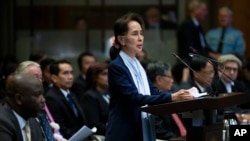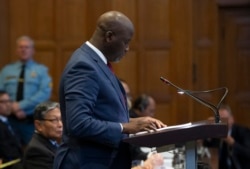Myanmar's leader and Nobel Peace laureate Aung San Suu Kyi has defended her government's actions before the International Court of Justice in The Hague against genocide accusations. Speaking at the court Wednesday, she called the case against her country incomplete and misleading.
Aung San Suu Kyi defended Myanmar's leadership against claims that genocide is happening in the country.
"Can there be genocidal intent on the part of a state that actively investigates, prosecutes, and punishes soldiers and officers who are accused of wrongdoing?,” she said.
The hearings of the case against Myanmar at the United Nations' highest court started on Tuesday and included detailed accusations of mass killings, torture and rapes against members of the Muslim Rohingya minority. The Gambia brought the case to the court to ask for protection for the Rohingya. More than 700,000 have fled to neighboring Bangladesh since 2017.
Aung San Suu Kyi, once seen as one of the world's greatest human rights defenders, argued Wednesday that the internal conflict might at most have led to potential violations of international humanitarian law.
Alison Smith of the NGO No Peace Without Justice said she is eager to see what the court makes of the defense argument.
"The fact that there may have been a conflict does not preclude that there might have been genocide. But also the experiences of the Rohingya, that we have been speaking with that were unveiled yesterday by the U.N. fact-finding mission, do not speak to an armed conflict but instead do speak to that genocide has taken place," she said.
A U.N. fact-finding mission in 2018 found that Myanmar's army showed genocidal intent' in its military operations.
Hla Kyaw is chairman of the European Rohingya Council and demonstrated in front of the court during Aung San Suu Kyi statement. He said this case is the beginning towards justice for the Rohingya.
"We are expecting justice from the international community. The International Court of Justice will be taking all of the measures to take action against genocide against our people. Therefore at this International Court of Justice we are hoping for justice for Rohingya people as soon as possible. At the end of the day, the truth will come out," he said.
Aung San Suu Kyi heads the Myanmar civilian government. Myanmar's military rulers had her under house arrest for 15 years. In 1991, she won the Nobel Peace Prize. However, after becoming part of the government, she has routinely denied reports of ethnic cleansing and defended the military.
A first ruling on the case and whether or not the Rohingya should be protected is expected within weeks.





